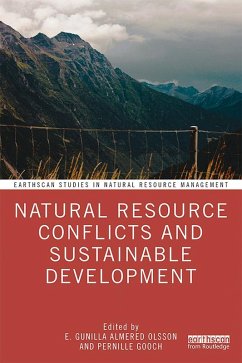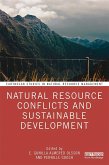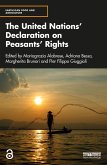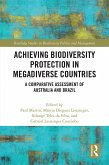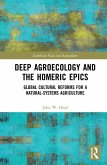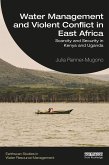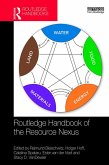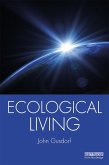Natural Resource Conflicts and Sustainable Development (eBook, PDF)
Redaktion: Olsson, E. Gunilla Almered; Gooch, Pernille
40,95 €
40,95 €
inkl. MwSt.
Sofort per Download lieferbar

20 °P sammeln
40,95 €
Als Download kaufen

40,95 €
inkl. MwSt.
Sofort per Download lieferbar

20 °P sammeln
Jetzt verschenken
Alle Infos zum eBook verschenken
40,95 €
inkl. MwSt.
Sofort per Download lieferbar
Alle Infos zum eBook verschenken

20 °P sammeln
Natural Resource Conflicts and Sustainable Development (eBook, PDF)
Redaktion: Olsson, E. Gunilla Almered; Gooch, Pernille
- Format: PDF
- Merkliste
- Auf die Merkliste
- Bewerten Bewerten
- Teilen
- Produkt teilen
- Produkterinnerung
- Produkterinnerung

Bitte loggen Sie sich zunächst in Ihr Kundenkonto ein oder registrieren Sie sich bei
bücher.de, um das eBook-Abo tolino select nutzen zu können.
Hier können Sie sich einloggen
Hier können Sie sich einloggen
Sie sind bereits eingeloggt. Klicken Sie auf 2. tolino select Abo, um fortzufahren.

Bitte loggen Sie sich zunächst in Ihr Kundenkonto ein oder registrieren Sie sich bei bücher.de, um das eBook-Abo tolino select nutzen zu können.
Providing both a theoretical background and practical examples of natural resource conflict, this volume explores the pressures on natural resources leading to scarcity and conflict.
- Geräte: PC
- mit Kopierschutz
- eBook Hilfe
- Größe: 8.9MB
Andere Kunden interessierten sich auch für
![Natural Resource Conflicts and Sustainable Development (eBook, ePUB) Natural Resource Conflicts and Sustainable Development (eBook, ePUB)]() Natural Resource Conflicts and Sustainable Development (eBook, ePUB)40,95 €
Natural Resource Conflicts and Sustainable Development (eBook, ePUB)40,95 €![The United Nations' Declaration on Peasants' Rights (eBook, PDF) The United Nations' Declaration on Peasants' Rights (eBook, PDF)]() The United Nations' Declaration on Peasants' Rights (eBook, PDF)39,95 €
The United Nations' Declaration on Peasants' Rights (eBook, PDF)39,95 €![Achieving Biodiversity Protection in Megadiverse Countries (eBook, PDF) Achieving Biodiversity Protection in Megadiverse Countries (eBook, PDF)]() Achieving Biodiversity Protection in Megadiverse Countries (eBook, PDF)42,95 €
Achieving Biodiversity Protection in Megadiverse Countries (eBook, PDF)42,95 €![Deep Agroecology and the Homeric Epics (eBook, PDF) Deep Agroecology and the Homeric Epics (eBook, PDF)]() John W. HeadDeep Agroecology and the Homeric Epics (eBook, PDF)41,95 €
John W. HeadDeep Agroecology and the Homeric Epics (eBook, PDF)41,95 €![Water Management and Violent Conflict in East Africa (eBook, PDF) Water Management and Violent Conflict in East Africa (eBook, PDF)]() Julia Renner-MugonoWater Management and Violent Conflict in East Africa (eBook, PDF)37,95 €
Julia Renner-MugonoWater Management and Violent Conflict in East Africa (eBook, PDF)37,95 €![Routledge Handbook of the Resource Nexus (eBook, PDF) Routledge Handbook of the Resource Nexus (eBook, PDF)]() Routledge Handbook of the Resource Nexus (eBook, PDF)46,95 €
Routledge Handbook of the Resource Nexus (eBook, PDF)46,95 €![Ecological Living (eBook, PDF) Ecological Living (eBook, PDF)]() John GusdorfEcological Living (eBook, PDF)46,95 €
John GusdorfEcological Living (eBook, PDF)46,95 €-
-
-
Providing both a theoretical background and practical examples of natural resource conflict, this volume explores the pressures on natural resources leading to scarcity and conflict.
Dieser Download kann aus rechtlichen Gründen nur mit Rechnungsadresse in A, B, BG, CY, CZ, D, DK, EW, E, FIN, F, GR, HR, H, IRL, I, LT, L, LR, M, NL, PL, P, R, S, SLO, SK ausgeliefert werden.
Produktdetails
- Produktdetails
- Verlag: Taylor & Francis eBooks
- Seitenzahl: 242
- Erscheinungstermin: 12. April 2019
- Englisch
- ISBN-13: 9781351268639
- Artikelnr.: 56842220
- Verlag: Taylor & Francis eBooks
- Seitenzahl: 242
- Erscheinungstermin: 12. April 2019
- Englisch
- ISBN-13: 9781351268639
- Artikelnr.: 56842220
- Herstellerkennzeichnung Die Herstellerinformationen sind derzeit nicht verfügbar.
E. Gunilla Almered Olsson is Professor in Human Ecology, School of Global Studies, University of Gothenburg, Sweden. Her interdisciplinary work in research and teaching is on use and management of natural resources and biodiversity involving knowledge integration in social-ecological systems in agricultural landscapes in Europe and Africa. She also worked on those issues for the Swedish government and the United Nations Environment Program. Current research is on urban resilience related to food systems and the linking of urban and rural regions within the context of sustainable development. She is a co-author to global assessments for the UN/Intergovernmental Science-Policy Platform on Biodiversity and Ecosystem Services (IPBES). Pernille Gooch is Associate Professor in the Human Ecology Division, Lund University, Sweden. Her main focus of research is the political ecology of human-environmental relations. She has done extensive fieldwork on forest conflicts in the Indian Himalayas. Other issues of interest include environmental justice, environmental history, gender, livelihood and participatory methods.
1. The sustainability paradox and the conflicts on use of natural resources
PART I Overview of natural resource use conflicts in relation to
sustainable development 2. Natural conflicts in the Capitalocene 3. Water,
conflict and social sustainability: bringing power into the water security
discourse 4. Water, conflict and social sustainability: bringing power into
the water security discourse 5. Conflicts in the management of fisheries:
the change in roles and perception of the Swedish fishing industry PART II
Case studies 6. The Raptor and the Lamb: Reintroduction of carnivores in
agricultural landscapes in Ireland 7. From Dystopia to Utopia - and back
again: The case of the Van Gujjars pastoralists in the Indian Himalaya 8.
Undermining the resource ground: extractive violence on Laevas and
Adnyamathanha land 9. Forest Governance in Post-Agreement Colombia 10. To
change, or not to change? The transboundary water question in the Nile
Basin PART III Transforming natural resource conflicts 11. Benefit sharing
for project risk-conflict reduction and fostering sustainable development:
current understanding and mechanisms 12. Power and knowledge use in coastal
conflict resolution 13. Environmental conflicts: towards theoretical
analyses of social-ecological systems 14. The transformative potential of
the food system concept: sustainability conflicts or sustainability
transitions?
PART I Overview of natural resource use conflicts in relation to
sustainable development 2. Natural conflicts in the Capitalocene 3. Water,
conflict and social sustainability: bringing power into the water security
discourse 4. Water, conflict and social sustainability: bringing power into
the water security discourse 5. Conflicts in the management of fisheries:
the change in roles and perception of the Swedish fishing industry PART II
Case studies 6. The Raptor and the Lamb: Reintroduction of carnivores in
agricultural landscapes in Ireland 7. From Dystopia to Utopia - and back
again: The case of the Van Gujjars pastoralists in the Indian Himalaya 8.
Undermining the resource ground: extractive violence on Laevas and
Adnyamathanha land 9. Forest Governance in Post-Agreement Colombia 10. To
change, or not to change? The transboundary water question in the Nile
Basin PART III Transforming natural resource conflicts 11. Benefit sharing
for project risk-conflict reduction and fostering sustainable development:
current understanding and mechanisms 12. Power and knowledge use in coastal
conflict resolution 13. Environmental conflicts: towards theoretical
analyses of social-ecological systems 14. The transformative potential of
the food system concept: sustainability conflicts or sustainability
transitions?
1. The sustainability paradox and the conflicts on use of natural resources
PART I Overview of natural resource use conflicts in relation to
sustainable development 2. Natural conflicts in the Capitalocene 3. Water,
conflict and social sustainability: bringing power into the water security
discourse 4. Water, conflict and social sustainability: bringing power into
the water security discourse 5. Conflicts in the management of fisheries:
the change in roles and perception of the Swedish fishing industry PART II
Case studies 6. The Raptor and the Lamb: Reintroduction of carnivores in
agricultural landscapes in Ireland 7. From Dystopia to Utopia - and back
again: The case of the Van Gujjars pastoralists in the Indian Himalaya 8.
Undermining the resource ground: extractive violence on Laevas and
Adnyamathanha land 9. Forest Governance in Post-Agreement Colombia 10. To
change, or not to change? The transboundary water question in the Nile
Basin PART III Transforming natural resource conflicts 11. Benefit sharing
for project risk-conflict reduction and fostering sustainable development:
current understanding and mechanisms 12. Power and knowledge use in coastal
conflict resolution 13. Environmental conflicts: towards theoretical
analyses of social-ecological systems 14. The transformative potential of
the food system concept: sustainability conflicts or sustainability
transitions?
PART I Overview of natural resource use conflicts in relation to
sustainable development 2. Natural conflicts in the Capitalocene 3. Water,
conflict and social sustainability: bringing power into the water security
discourse 4. Water, conflict and social sustainability: bringing power into
the water security discourse 5. Conflicts in the management of fisheries:
the change in roles and perception of the Swedish fishing industry PART II
Case studies 6. The Raptor and the Lamb: Reintroduction of carnivores in
agricultural landscapes in Ireland 7. From Dystopia to Utopia - and back
again: The case of the Van Gujjars pastoralists in the Indian Himalaya 8.
Undermining the resource ground: extractive violence on Laevas and
Adnyamathanha land 9. Forest Governance in Post-Agreement Colombia 10. To
change, or not to change? The transboundary water question in the Nile
Basin PART III Transforming natural resource conflicts 11. Benefit sharing
for project risk-conflict reduction and fostering sustainable development:
current understanding and mechanisms 12. Power and knowledge use in coastal
conflict resolution 13. Environmental conflicts: towards theoretical
analyses of social-ecological systems 14. The transformative potential of
the food system concept: sustainability conflicts or sustainability
transitions?
